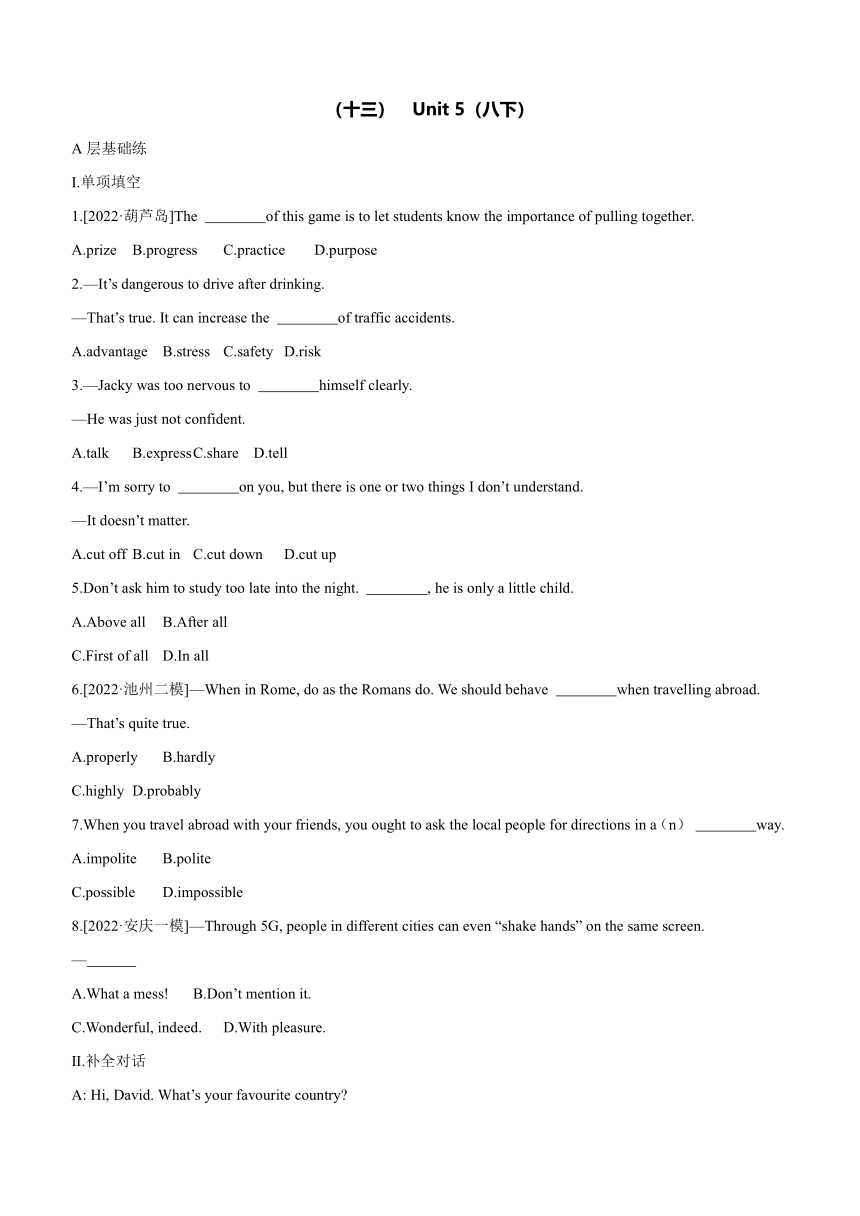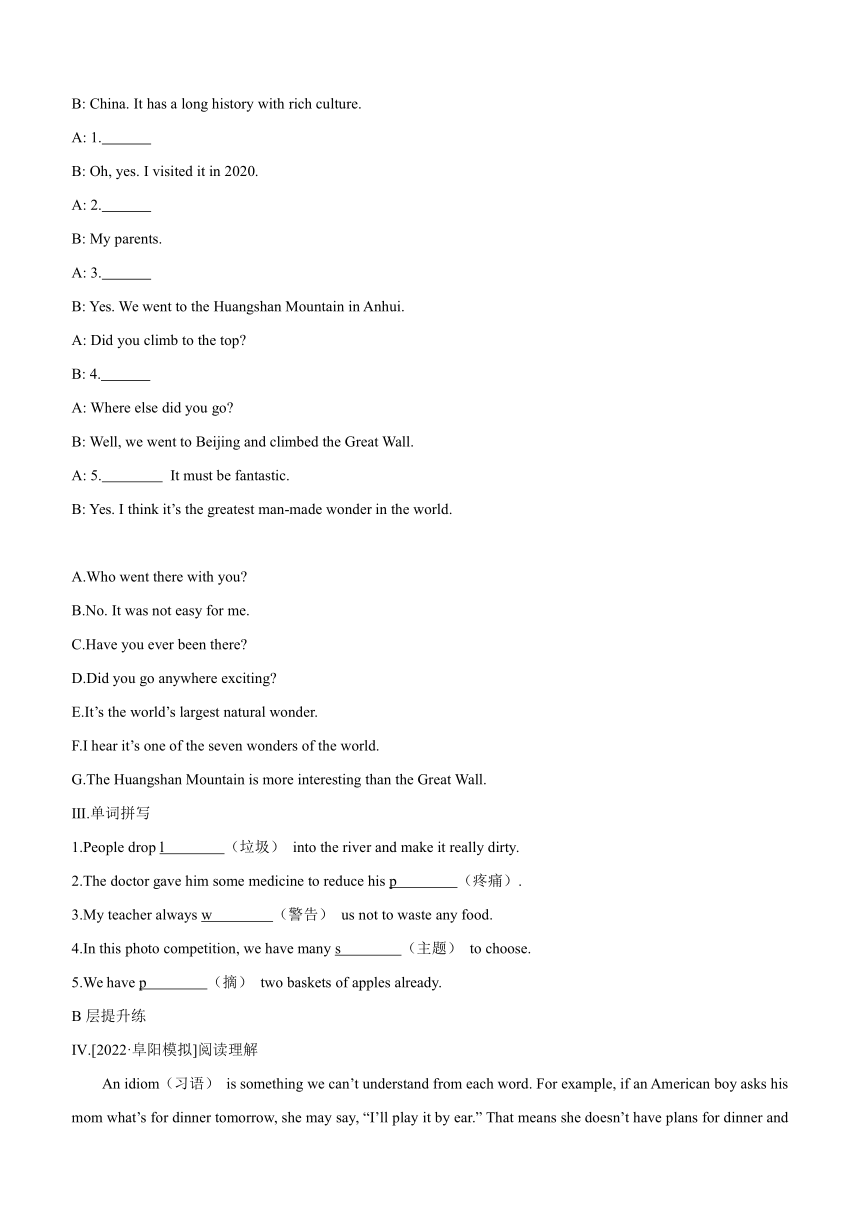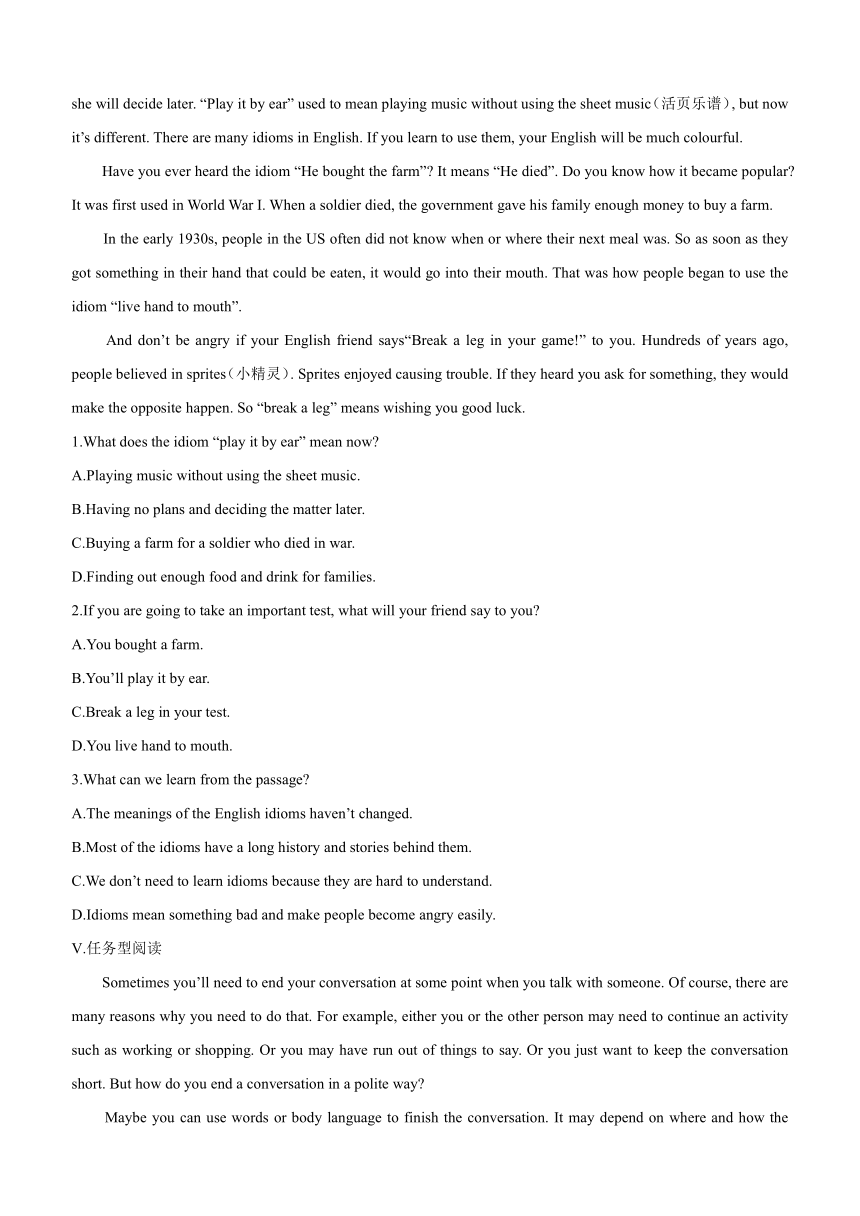2023年中考英语(牛津译林版)一轮复习课时训练13 Unit 5(八下)(含答案)
文档属性
| 名称 | 2023年中考英语(牛津译林版)一轮复习课时训练13 Unit 5(八下)(含答案) |  | |
| 格式 | docx | ||
| 文件大小 | 25.8KB | ||
| 资源类型 | 教案 | ||
| 版本资源 | 牛津译林版 | ||
| 科目 | 英语 | ||
| 更新时间 | 2023-03-13 17:02:19 | ||
图片预览



文档简介
(十三) Unit 5(八下)
A层基础练
Ⅰ.单项填空
1.[2022·葫芦岛]The of this game is to let students know the importance of pulling together.
A.prize B.progress C.practice D.purpose
2.—It’s dangerous to drive after drinking.
—That’s true. It can increase the of traffic accidents.
A.advantage B.stress C.safety D.risk
3.—Jacky was too nervous to himself clearly.
—He was just not confident.
A.talk B.express C.share D.tell
4.—I’m sorry to on you, but there is one or two things I don’t understand.
—It doesn’t matter.
A.cut off B.cut in C.cut down D.cut up
5.Don’t ask him to study too late into the night. , he is only a little child.
A.Above all B.After all
C.First of all D.In all
6.[2022·池州二模]—When in Rome, do as the Romans do. We should behave when travelling abroad.
—That’s quite true.
A.properly B.hardly
C.highly D.probably
7.When you travel abroad with your friends, you ought to ask the local people for directions in a(n) way.
A.impolite B.polite
C.possible D.impossible
8.[2022·安庆一模]—Through 5G, people in different cities can even “shake hands” on the same screen.
—
A.What a mess! B.Don’t mention it.
C.Wonderful, indeed. D.With pleasure.
Ⅱ.补全对话
A: Hi, David. What’s your favourite country
B: China. It has a long history with rich culture.
A: 1.
B: Oh, yes. I visited it in 2020.
A: 2.
B: My parents.
A: 3.
B: Yes. We went to the Huangshan Mountain in Anhui.
A: Did you climb to the top
B: 4.
A: Where else did you go
B: Well, we went to Beijing and climbed the Great Wall.
A: 5. It must be fantastic.
B: Yes. I think it’s the greatest man-made wonder in the world.
A.Who went there with you
B.No. It was not easy for me.
C.Have you ever been there
D.Did you go anywhere exciting
E.It’s the world’s largest natural wonder.
F.I hear it’s one of the seven wonders of the world.
G.The Huangshan Mountain is more interesting than the Great Wall.
Ⅲ.单词拼写
1.People drop l (垃圾) into the river and make it really dirty.
2.The doctor gave him some medicine to reduce his p (疼痛).
3.My teacher always w (警告) us not to waste any food.
4.In this photo competition, we have many s (主题) to choose.
5.We have p (摘) two baskets of apples already.
B层提升练
Ⅳ.[2022·阜阳模拟]阅读理解
An idiom(习语) is something we can’t understand from each word. For example, if an American boy asks his mom what’s for dinner tomorrow, she may say, “I’ll play it by ear.” That means she doesn’t have plans for dinner and she will decide later. “Play it by ear” used to mean playing music without using the sheet music(活页乐谱), but now it’s different. There are many idioms in English. If you learn to use them, your English will be much colourful.
Have you ever heard the idiom “He bought the farm” It means “He died”. Do you know how it became popular It was first used in World War Ⅰ. When a soldier died, the government gave his family enough money to buy a farm.
In the early 1930s, people in the US often did not know when or where their next meal was. So as soon as they got something in their hand that could be eaten, it would go into their mouth. That was how people began to use the idiom “live hand to mouth”.
And don’t be angry if your English friend says“Break a leg in your game!” to you. Hundreds of years ago, people believed in sprites(小精灵). Sprites enjoyed causing trouble. If they heard you ask for something, they would make the opposite happen. So “break a leg” means wishing you good luck.
1.What does the idiom “play it by ear” mean now
A.Playing music without using the sheet music.
B.Having no plans and deciding the matter later.
C.Buying a farm for a soldier who died in war.
D.Finding out enough food and drink for families.
2.If you are going to take an important test, what will your friend say to you
A.You bought a farm.
B.You’ll play it by ear.
C.Break a leg in your test.
D.You live hand to mouth.
3.What can we learn from the passage
A.The meanings of the English idioms haven’t changed.
B.Most of the idioms have a long history and stories behind them.
C.We don’t need to learn idioms because they are hard to understand.
D.Idioms mean something bad and make people become angry easily.
Ⅴ.任务型阅读
Sometimes you’ll need to end your conversation at some point when you talk with someone. Of course, there are many reasons why you need to do that. For example, either you or the other person may need to continue an activity such as working or shopping. Or you may have run out of things to say. Or you just want to keep the conversation short. But how do you end a conversation in a polite way
Maybe you can use words or body language to finish the conversation. It may depend on where and how the conversation started. It may also depend on your relationship with the other person. If you know that person, you can just say, “I need to run now.” Or you can say, “I’ll catch you later.” You may also give a reason for ending the conversation. “I really need to go—my piano lessons will start in ten minutes.”
Perhaps you just meet someone in a social situation, and you have a nice talk. When you have to depart(离开), you can say, “It’s nice meeting you. Maybe we can talk happily again sometime in the future.”
Another way to end a conversation is to make it easy for the other person to leave. If you see the other person is already not patient, you can say, “Well, I’m sure you have a lot to do today.”
You could use these tips to end a conversation, and you should notice that others may also use them. If they do so, you should know that it’s time for you to stop.
1.How many reasons does the writer mention to end a conversation at some point (不超过5个词)
2.What can we use to end a conversation (不超过10个词)
3.What does the passage mainly talk about (不超过10个词)
Ⅵ.[2022·黄石]完形填空
An old saying goes, “When in Rome(罗马), do as the Romans do.” I learned the meaning of this when I studied in Russia.
One day I 1 some of my Chinese friends to a famous local restaurant in Moscow. My guests and I were excited from visiting Red Square and happy about our meeting. We chatted 2 until the waiter told me that we were talking too loud. We turned our voices lower. But this didn’t last long. The waiter came over to us two more times with the same 3 .
How bad an impression(印象) we must have left on the local people! In China, it’s natural and 4 for a host(主人) to make a lively atmosphere(气氛). However, in Russia and Western countries, having a meal in a public place means you must 5 your voice low. You need to be polite to others.
I felt 6 about this. Even though we tried our best, it’s very difficult to form a new habit. Russians have their own special habits. My Russian friend, Andrey, always looks around and thinks for a while before leaving home. I asked him 7 he did this. “Aha,” Andrey said, “in Russia, people always spend about a minute 8 things and plans in their minds before leaving. So they won’t leave 9 necessary behind.”
Finding the differences between 10 is very interesting. I’d like to keep my eyes and mind open.
1.A.made B.invited C.told D.taught
2.A.surprisingly B.friendly
C.warmly D.carefully
3.A.message B.menu C.meal D.food
4.A.different B.serious
C.important D.interesting
5.A.take B.remain C.have D.keep
6.A.bad B.strange C.angry D.nervous
7.A.how B.when C.why D.where
8.A.going around B.going over
C.going on D.going for
9.A.nothing B.something
C.everything D.anything
10.A.friends B.knowledge
C.people D.cultures
答案
A层基础练
Ⅰ.1—5 DDBBB 6—8 ABC
Ⅱ.1—5 CADBF
Ⅲ.1.litter 2.pain
3.warns 4.subjects
5.picked
B层提升练
Ⅳ.1—3 BCB
Ⅴ.1.3/Three.
2.You/We can use words or body language./Words or body language.
3.How we end a conversation in a polite way./How to end a conversation in a polite way./Tips/Advice/Suggestions on/about ending a conversation in a polite way.
Ⅵ.
1.B
2.C
3.A
4.C
5.D
6.A
7.C
8.B
9.D
10.D
A层基础练
Ⅰ.单项填空
1.[2022·葫芦岛]The of this game is to let students know the importance of pulling together.
A.prize B.progress C.practice D.purpose
2.—It’s dangerous to drive after drinking.
—That’s true. It can increase the of traffic accidents.
A.advantage B.stress C.safety D.risk
3.—Jacky was too nervous to himself clearly.
—He was just not confident.
A.talk B.express C.share D.tell
4.—I’m sorry to on you, but there is one or two things I don’t understand.
—It doesn’t matter.
A.cut off B.cut in C.cut down D.cut up
5.Don’t ask him to study too late into the night. , he is only a little child.
A.Above all B.After all
C.First of all D.In all
6.[2022·池州二模]—When in Rome, do as the Romans do. We should behave when travelling abroad.
—That’s quite true.
A.properly B.hardly
C.highly D.probably
7.When you travel abroad with your friends, you ought to ask the local people for directions in a(n) way.
A.impolite B.polite
C.possible D.impossible
8.[2022·安庆一模]—Through 5G, people in different cities can even “shake hands” on the same screen.
—
A.What a mess! B.Don’t mention it.
C.Wonderful, indeed. D.With pleasure.
Ⅱ.补全对话
A: Hi, David. What’s your favourite country
B: China. It has a long history with rich culture.
A: 1.
B: Oh, yes. I visited it in 2020.
A: 2.
B: My parents.
A: 3.
B: Yes. We went to the Huangshan Mountain in Anhui.
A: Did you climb to the top
B: 4.
A: Where else did you go
B: Well, we went to Beijing and climbed the Great Wall.
A: 5. It must be fantastic.
B: Yes. I think it’s the greatest man-made wonder in the world.
A.Who went there with you
B.No. It was not easy for me.
C.Have you ever been there
D.Did you go anywhere exciting
E.It’s the world’s largest natural wonder.
F.I hear it’s one of the seven wonders of the world.
G.The Huangshan Mountain is more interesting than the Great Wall.
Ⅲ.单词拼写
1.People drop l (垃圾) into the river and make it really dirty.
2.The doctor gave him some medicine to reduce his p (疼痛).
3.My teacher always w (警告) us not to waste any food.
4.In this photo competition, we have many s (主题) to choose.
5.We have p (摘) two baskets of apples already.
B层提升练
Ⅳ.[2022·阜阳模拟]阅读理解
An idiom(习语) is something we can’t understand from each word. For example, if an American boy asks his mom what’s for dinner tomorrow, she may say, “I’ll play it by ear.” That means she doesn’t have plans for dinner and she will decide later. “Play it by ear” used to mean playing music without using the sheet music(活页乐谱), but now it’s different. There are many idioms in English. If you learn to use them, your English will be much colourful.
Have you ever heard the idiom “He bought the farm” It means “He died”. Do you know how it became popular It was first used in World War Ⅰ. When a soldier died, the government gave his family enough money to buy a farm.
In the early 1930s, people in the US often did not know when or where their next meal was. So as soon as they got something in their hand that could be eaten, it would go into their mouth. That was how people began to use the idiom “live hand to mouth”.
And don’t be angry if your English friend says“Break a leg in your game!” to you. Hundreds of years ago, people believed in sprites(小精灵). Sprites enjoyed causing trouble. If they heard you ask for something, they would make the opposite happen. So “break a leg” means wishing you good luck.
1.What does the idiom “play it by ear” mean now
A.Playing music without using the sheet music.
B.Having no plans and deciding the matter later.
C.Buying a farm for a soldier who died in war.
D.Finding out enough food and drink for families.
2.If you are going to take an important test, what will your friend say to you
A.You bought a farm.
B.You’ll play it by ear.
C.Break a leg in your test.
D.You live hand to mouth.
3.What can we learn from the passage
A.The meanings of the English idioms haven’t changed.
B.Most of the idioms have a long history and stories behind them.
C.We don’t need to learn idioms because they are hard to understand.
D.Idioms mean something bad and make people become angry easily.
Ⅴ.任务型阅读
Sometimes you’ll need to end your conversation at some point when you talk with someone. Of course, there are many reasons why you need to do that. For example, either you or the other person may need to continue an activity such as working or shopping. Or you may have run out of things to say. Or you just want to keep the conversation short. But how do you end a conversation in a polite way
Maybe you can use words or body language to finish the conversation. It may depend on where and how the conversation started. It may also depend on your relationship with the other person. If you know that person, you can just say, “I need to run now.” Or you can say, “I’ll catch you later.” You may also give a reason for ending the conversation. “I really need to go—my piano lessons will start in ten minutes.”
Perhaps you just meet someone in a social situation, and you have a nice talk. When you have to depart(离开), you can say, “It’s nice meeting you. Maybe we can talk happily again sometime in the future.”
Another way to end a conversation is to make it easy for the other person to leave. If you see the other person is already not patient, you can say, “Well, I’m sure you have a lot to do today.”
You could use these tips to end a conversation, and you should notice that others may also use them. If they do so, you should know that it’s time for you to stop.
1.How many reasons does the writer mention to end a conversation at some point (不超过5个词)
2.What can we use to end a conversation (不超过10个词)
3.What does the passage mainly talk about (不超过10个词)
Ⅵ.[2022·黄石]完形填空
An old saying goes, “When in Rome(罗马), do as the Romans do.” I learned the meaning of this when I studied in Russia.
One day I 1 some of my Chinese friends to a famous local restaurant in Moscow. My guests and I were excited from visiting Red Square and happy about our meeting. We chatted 2 until the waiter told me that we were talking too loud. We turned our voices lower. But this didn’t last long. The waiter came over to us two more times with the same 3 .
How bad an impression(印象) we must have left on the local people! In China, it’s natural and 4 for a host(主人) to make a lively atmosphere(气氛). However, in Russia and Western countries, having a meal in a public place means you must 5 your voice low. You need to be polite to others.
I felt 6 about this. Even though we tried our best, it’s very difficult to form a new habit. Russians have their own special habits. My Russian friend, Andrey, always looks around and thinks for a while before leaving home. I asked him 7 he did this. “Aha,” Andrey said, “in Russia, people always spend about a minute 8 things and plans in their minds before leaving. So they won’t leave 9 necessary behind.”
Finding the differences between 10 is very interesting. I’d like to keep my eyes and mind open.
1.A.made B.invited C.told D.taught
2.A.surprisingly B.friendly
C.warmly D.carefully
3.A.message B.menu C.meal D.food
4.A.different B.serious
C.important D.interesting
5.A.take B.remain C.have D.keep
6.A.bad B.strange C.angry D.nervous
7.A.how B.when C.why D.where
8.A.going around B.going over
C.going on D.going for
9.A.nothing B.something
C.everything D.anything
10.A.friends B.knowledge
C.people D.cultures
答案
A层基础练
Ⅰ.1—5 DDBBB 6—8 ABC
Ⅱ.1—5 CADBF
Ⅲ.1.litter 2.pain
3.warns 4.subjects
5.picked
B层提升练
Ⅳ.1—3 BCB
Ⅴ.1.3/Three.
2.You/We can use words or body language./Words or body language.
3.How we end a conversation in a polite way./How to end a conversation in a polite way./Tips/Advice/Suggestions on/about ending a conversation in a polite way.
Ⅵ.
1.B
2.C
3.A
4.C
5.D
6.A
7.C
8.B
9.D
10.D
